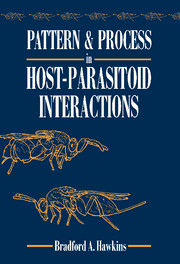6 - Hyperparasitoids
Published online by Cambridge University Press: 04 May 2010
Summary
Introduction
Up to this point I have dealt exclusively with the patterns found for primary parasitoid complexes and their herbivorous hosts. However, parasitoids themselves are often subject to attack by obligatory hyperparasitoids (as well as facultative hyperparasitoids), and these hyperparasitoid complexes can also be quite rich, sometimes rivaling the species richness of the primary parasitoids. For example, the teak defoliator Pyrausta machaeralis (Walker) (Lepidoptera: Pyralidae) has 42 reported species of obligatory hyperparasitoids and 42 primary parasitoids in Burma (Garthwaite & Desai, 1939). Occasionally, hyperparasitoid species richness may even greatly exceed that of the primaries. The citrus psylla, Trioza erytreae (Del Guercio) (Homoptera: Psyllidae), supports two primary parasitoids and 13 species of hyperparasitoids and tertiary hyperparasitoids (i.e. parasitoids of the hyperparasitoids) in South Africa (McDaniel & Moran, 1972). But despite these few examples, it appears that in general hyperparasitoid richness is lower than primary richness, and many parasitoid complexes may be entirely free of obligatory hyperparasitoids.
A major problem when attempting to evaluate hyperparasitoid complexes is that they have been relatively poorly studied, with most of the emphasis on working out complex, sometimes bizarre biologies of individual species. The hyperparasitoids of Homoptera have received the most attention (see review in Sullivan, 1987), whereas those of holometabolous herbivores have been more erratically studied.
- Type
- Chapter
- Information
- Pattern and Process in Host-Parasitoid Interactions , pp. 132 - 150Publisher: Cambridge University PressPrint publication year: 1994



